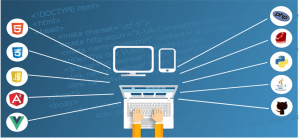
Why Is It Important to Become a Polyglot Developer?
Сoders who know several programming languages (or PLs) are highly valued in IT. These employees are called polyglots. Regular software engineers have to attend specific coding courses to become such a specialist. And if the ordinary developers need programming homework help when learning new languages, they commonly visit corresponding websites.
Polyglot programming is quite spread among experienced coders. Mostly, that’s about full-stack (front-end + back-end) developers. For example, by the Stack Overflow Developer Survey, such programmers accounted for more than 49% of the total number of software engineers worldwide in 2021. So, to build a successful career, common coders should learn as many programming languages as possible.
What Is Polyglot Programming in a Few Words?
This term is applied to refer to the software development process by a single specialist using several coding languages. Thus, it’s not enough for a polyglot programmer to simply know the key features of several PLs. So, such specialists need to be able to fulfill complex tasks by applying coding languages they know.
Moreover, multilingual developers can usually evaluate which PL is better to apply to complete a particular assignment. Such an approach to software creation helps them save time and effort. That’s why the described IT employees might earn much more money compared to ordinary coders.

How to Become a Polyglot Programmer?
There are no clear criteria for awarding such a title to a coder. E.g., some experts think these software engineers should know at least two programming languages. However, by the Coding Dojo Research, numerous well-known companies demand that their developers know much more PLs. So, let’s look at the requirements of some huge enterprises:
- Apple demands that its IT specialists be able to use six coding languages. Thus, the company developers may need help with JS, Java, Python, Perl, PHP, and Ruby.
- Amazon.com also wants its coders to know six PLs. So, assistance with C++, Swift, Ruby, JS, Python, as well as Java can be necessary for the platform programmers.
- Walmart requires its software engineers to be able to create apps by applying four PLs. Therefore, the enterprise’s coders may need help with Python, JS, Perl, and Java.
Thus, it’s much more likely to get a job in a large corporation for the polyglot developers who know at least four PLs.
Multilingual Programming Pros and Cons
So, what is a polyglot developer? It is a specialist who permanently learns. So, it’s necessary to be ready to spend quite a lot of time visiting different pieces of training as well as seeking qualified computer science homework help for those wanting to become a multilingual coder. However, this allows for making loads of useful contacts. Other multilingual coding features are below.
Primary Polyglot Development Advantages
Knowledge of several PLs greatly expands creative possibilities. This allows programmers to look at certain things from different points of view. Nay, experts note the next benefits of being a polyglot software engineer:
- low risk of losing a job due to unsuitability because a certain programming language has become obsolete;
- extensive employment opportunities and the ability to choose employers;
- absence of aversion to work due to the performance of typical tasks on the same PL.
Finally, multilingual developers have a deep comprehension of not just syntax but also coding languages’ concepts and semantics. Thus, they get rid of the programming habits that take extra time. Specialists who apply predominantly in one language usually have such wonts.
Main Polyglot Development Flaws
Coders who know several program languages may confuse their concepts. To reduce the likelihood of such problems, experts recommend polyglot engineers not learn a few PLs simultaneously. Nay, it’s worth allocating enough time for a qualitative study of each specific coding language.
Developers can find more information on this topic in the thematic blogs. And those who want to practice just learned PLs may get a job on specific platforms offering work for inexperienced specialists. Best of luck to you!





